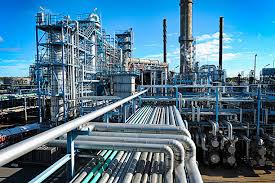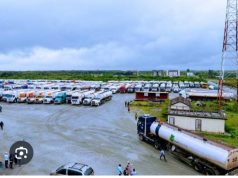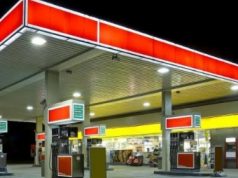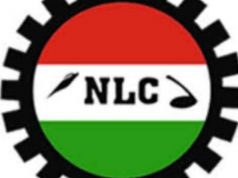By LOD ONYEJI
HEAD ADMIN/STRATEGIES, Tradepower Global Communications
The true story of Nigerian fuel importation is only paradoxically a case of man by the riverbank, yet crying of soapy eyes or washing his hands with spittle. This statement of fact is disdainfully pitiable when as a matter of fact, Nigeria has over four standard refineries begging for maintenance in order to give the nation optimum performance benefits. It is more painful at the knowledge of the fact that the imported fuel is of lower quality compared to even the illegally-refined fuel in the Niger-Delta creeks.
There is no other coloration to the statement of fact that the importation of petroleum products has remained a major financial burden to Nigeria, especially with its attendant fraudulent fuel subsidy regime where successive governments have used the later as a cardinal campaign tool only to shift the goal posts. Every now and then you see our government officials playing to the gallery, exhibiting their economic illiteracy by destroying what ordinarily would have formed the bed rock of Private partnership development goal in oil refining and distribution locally, thereby killing and burying the oil sector monster called “fuel subsidy”.
As matter of fact, a recent study by some stakeholders under the aegis, Stakeholders Democracy Network (SDN) revealed that black market fuel refined in the creeks of the Niger Delta tends to have higher quality than the legally imported petrol and diesel into Nigeria from Europe. In a place where proactiveness is alive, the so-called illegal refineries in the Creeks of Nigerian Delta would have been positively channeled to micro/mini refining facilities that would be properly captured by the relevant government agencies and through that increase the national internally grown economy, with adequate taxations and other regulatory changes. The absence of this system spells more losses for the nation.

There is no gainsaying that Nigeria has the capacity to pump over 2 million barrels a day of high grade “Bonny Light” crude when Nigeria’s refining capacity has been heavily reduced to nothing due to the dysfunctional state of four of Nigeria’s refineries which are managed by the Nigeria National Petroleum Corporation, NNPC. What this avails any discerning mind is that competency has been slaughtered on the altar of nepotistic sentimentality. Of fact, no nation moves in such retrogression and corruption to any meaningful height. It’s worse in Nigeria, where the NNPC continues to spend billions of naira to maintain the loss-making refineries, without any meaningful progress and no one is asking questions from the Executive and Legislative arm of government or due prosecution from the Judicial arm. What a case? Indeed, Nigeria imports about 900,000 tons of low-grade European fuel mainly refined in Belgium and Netherlands which has led to horrible air pollution in Nigeria’s major cities. The report has it that the fuel imported by Nigeria surpassed the EU pollution limit for gasoline by over 43 times.
The SDN found out the fuel imported by Nigeria can’t even be sold to countries with higher environmental standards and of lower grade than illegally refined crude in the Niger delta hence Nigeria is ranked Number 4 globally in deaths related to air pollution, about 114,000 Nigerians die every year from respiratory diseases due to air pollution.
Nigerian cities like Port Harcourt have been dealing with a black soot problem for the past couple of years now due to Gas- Flaring and illegal oil refining issues in nearby communities. The illegal refineries now produce up to 20% of the fuel consumed in Nigeria, according to the report, which clearly stated that with the outbreak of the COVID-19 which attacks the respiratory organs, the high levels of pollution poses a threat to the health of Nigerians especially those in the Niger Delta regions and other heavily polluted areas.
In 2017, Nigeria and her West African neighbours like Ghana, Togo, Benin, and Ivory Coast promised to stop importations of low grade European refined fuel. However, only Ghana has acted on its promise as Nigeria claims it needs more time to comply. This is the very reason everyone with a genuine interest in Nigerian’s development needs to rally round for the leaders to be urgently directed to enforce the sulfur demands and engage with local refiners working with Nigeria’s high grade of crude to reduce pollution and mandate NNPC to end oil-for-fuel swap system. Encouraging our local refining; is a panacea for Nigeria’s reliance on imported refined products disengagement.
In a recent development, most Nigerians are still in shock that Nigeria oil management incompetency has graduated to signing a Memorandum of Understanding for petroleum products importation with the Government of Niger Republic, a country of about 22.44 million people. In a statement in Abuja recently, Group General Manager/Special Adviser on Media to the Minister of State for Petroleum Resources, Garba Deen Muhammad, said the MoU was reached following bilateral agreements between President Muhammadu Buhari and President Mahamadou Issoufou of Niger. This development has as a matter of fact angered most Nigerians, as they described it as an act of retrogression for the country
According to a statement, Soraz Refinery in Zinder, Niger Republic some 260km from the Nigerian border, has an installed refining capacity of 20,000 barrels per day compared to the nation’s 5,000bpd domestic requirement. This leaves a surplus of 15,000 barrels per day. Mele Kyari, Group Managing Director of the Nigerian National Petroleum Corporation, signed the MoU on behalf of Nigeria while Alio Toune, Director-General of Niger Republic’s National Oil Company, Societe Nigerienne De Petrole, signed on behalf of his country.
The shock became more intense as Timipre Sylva, Nigeria’s Minister of State for Petroleum Resources, has asked citizens to be proud of the country for the importation of refined petrol from neighbouring Niger Republic. Speaking shortly after the MoU signing, Sylva expressed delight over the development, describing it as another huge step in developing trade relations between both countries. “Nigerians should be proud that we are doing that to encourage sub-regional trade because we have been talking about sub-regional trade for a long time and this is how it should be between neighbouring countries. Niger should import from us what they don’t have and we should be able to import from Niger what they have. Let us encourage intra-regional
It is most surprising to note that, Niger one of the poorest nations in the world has succeeded in developing its refinery to produce at a greater capacity than its very rich neighbour, Nigeria.
Reacting to this development, Olusegun Bamgbose, National Coordinator, Concerned Advocates for Good Governance, CAGG, has made some revelations that the MoU was between Nigeria and China. The senior lawyer and 2023 presidential hopeful, said that the Société de Raffinage de Zinder, SORAZ Refinery is owned by China.
“In June 2008, China National Petroleum Corporation, CNPC, and the Niger Republic signed integrated upstream and downstream deals in Agadem block which resulted in the building of SORAZ refinery. “The major shareholder in the refinery is China National Petroleum Corporation with 60% shareholding and the Niger Republic has 40% shareholding. In essence, China facilitated MoU because of their interest. This is certainly one of the hidden conditions given to Nigeria in order to secure Chinese loans”.
“One can equally remember that FEC in September okayed $1.96bn for proposed rail contract from Kano to the Niger Republic. We secured the loan from China and it’s also the Chinese company that will be in charge. This government should stop fooling Nigerians and Nigerians should not forget that this is neocolonialism cropping up.
The fear is that China may soon take over the machinery of government in Nigeria. This latest MoU may very clearly be a big obstacle to Dangote Refinery and Nigerians have not been told about the duration of the MoU signed. China has bought over the Executive and the National Assembly. This is very dangerous. It’s most likely that China may equally play a leading role in who becomes the President in 2023.”
The Human Rights Writers Association of Nigeria, HURIWA, has faulted the move by the Nigerian government to commence importation of fuel from the Niger Republic. HURIWA said the decision of President Muhammadu Buhari to sign a Memorandum of Understanding with the Niger Republic for the importation of fuel stands condemned as they faulted Nigeria’s inability to fix its refineries. A statement by HURIWA’s National Coordinator, Emmanuel Onwubiko said the move to import from the Niger Republic shows a systemic failure.
“The failure of the administration to fix Nigeria’s three or four refineries in preference for the patronizing Niger Republic is an act of systemic and systematic economic sabotage against the Federal Republic of Nigeria. If Nigeria has an independent National Assembly headed by independent-minded patriotic statesmen and not these executive attack dogs, the central legislature would have probed the unbridled enthusiasm of President Muhammadu Buhari to corner the resources of over $1 billion USD of Nigeria to build Railways from Kano state in North West of Nigeria to Maradi deep inside the Niger Republic and now the signing of the Memorandum of Understanding to begin the importation of fuel from Niger.”
In conclusion, one will continue to wonder why Nigeria has continued to play unreasonable politics with this all-important sector that has the capacity to better our lots in terms of forex, job creation, entrepreneurial upliftment, inflation reduction, power upgrade, and above all ease of transportation and enhancement of better living.










